Oxidative stress and inflammation play important roles in neuronal injury caused by intracerebral hemorrhage (ICH). Uric acid (UA), as an important natural antioxidant, may reduce neuronal injury caused by ICH. Delineating the relationship between UA and ICH will enhance our understanding of antioxidative mechanisms in recovery from ICH.
We conducted a retrospective study, in 325 patients with acute supratentorial ICH, to investigate the relationship between serum UA levels and hematoma volumes and prognosis. A hematoma volume of ≥ 30 ml was defined as a large hematoma volume. Unfavorable outcome was defined as having a modified Rankin Scale (mRS) score of 4-6 on Day 30.
Serum UA was significantly lower in large hematoma volume patients [306 (243-411) μmol/L] than in small hematoma volume patients [357 (271-442) μmol/L] (P = 0.012). Similarly, the unfavorable outcome group had lower serum UA (median 309 vs. 363 μmol/L) (P = 0.009) in comparison to the favorable outcome group. Multivariate logistic analysis indicated that lower serum UA was associated with a larger hematoma volume (odds ratio, 0.996; P = 0.006) and an unfavorable outcome (odds ratio, 0.997; P = 0.030).
This study indicates that in patients with acute supratentorial ICH, a low serum UA level may indicate that the patient has a large hematoma volume and may be a risk factor for poor Day 30 functional prognosis.
Copyright © 2020 Elsevier Inc. All rights reserved.
Relationship of serum uric acid to hematoma volume and prognosis in patients with acute supratentorial intracerebral hemorrhage.


